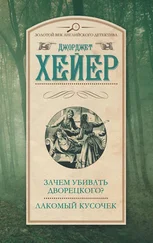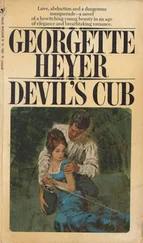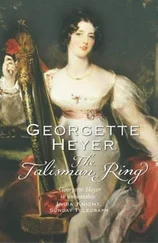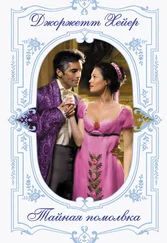Джорджетт Хейер - Penhallow
Здесь есть возможность читать онлайн «Джорджетт Хейер - Penhallow» весь текст электронной книги совершенно бесплатно (целиком полную версию без сокращений). В некоторых случаях можно слушать аудио, скачать через торрент в формате fb2 и присутствует краткое содержание. Год выпуска: 1942, Жанр: Детектив, на английском языке. Описание произведения, (предисловие) а так же отзывы посетителей доступны на портале библиотеки ЛибКат.
- Название:Penhallow
- Автор:
- Жанр:
- Год:1942
- ISBN:нет данных
- Рейтинг книги:3 / 5. Голосов: 1
-
Избранное:Добавить в избранное
- Отзывы:
-
Ваша оценка:
- 60
- 1
- 2
- 3
- 4
- 5
Penhallow: краткое содержание, описание и аннотация
Предлагаем к чтению аннотацию, описание, краткое содержание или предисловие (зависит от того, что написал сам автор книги «Penhallow»). Если вы не нашли необходимую информацию о книге — напишите в комментариях, мы постараемся отыскать её.
Penhallow — читать онлайн бесплатно полную книгу (весь текст) целиком
Ниже представлен текст книги, разбитый по страницам. Система сохранения места последней прочитанной страницы, позволяет с удобством читать онлайн бесплатно книгу «Penhallow», без необходимости каждый раз заново искать на чём Вы остановились. Поставьте закладку, и сможете в любой момент перейти на страницу, на которой закончили чтение.
Интервал:
Закладка:
“When I’m dead, you can start pulling the house about: you won’t do it in my time,” responded Penhallow. “What’s brought you here this morning? Pleasure of my company?”
“Oh, I do get a lot of pleasure out of your company,” Eugene assured him. “I like this room, too. It’s utterly atrocious, artistically speaking — and that bit of so-called Dresden is a fake, though I don’t suppose you’ll take my word for it — but it has an atmosphere — er — not all due to that overfed bitch of yours.”
Penhallow grinned at him. “She’s old, like me. I’m overfed, too.”
“But you don’t stink,” murmured Eugene plaintively, stirring the spaniel with one elegantly shod foot. He turned his head, and said with a faint lift to his brows: “Are you really taking Clay away from college?”
“Oh, so Faith’s been pouring out her grievances to you, has she? She hasn’t wasted much time. Yes, I am.”
“Not to say pouring,” Eugene corrected. “I don’t mean that that wasn’t the general idea — which just goes to show she must be very upset, because she doesn’t really like me: I can’t think why, for I’m sure I’m very nice to her — but I can’t bear listening to other people’s troubles, they’re always so boring. Besides, she’s decidedly hysterical, which I find most unnerving. So I came to sit with you. But she says you’re going to make him study law with Cliff?”
“ It’s about all he’s fit for,” replied Penhallow. “He isn’t doing any good at Cambridge, and never would, if he lived there for the rest of his life.”
“No, I feel sure you’re right,” Eugene agreed. “I shouldn’t think he’s doing any harm either, though — which, if you come to consider the matter, seems to be a fair epitome of Clay’s character.”
““There are times when I wonder if the little worm can possibly be a son of mine!” said Penhallow, with a touch of violence.
“Oh, I should think he must be, sir!” said Eugene, with a flicker of his sweet smile. “I mean, I don’t want you to think that I’m criticising Faith, but she always seems to me to lack the sort of enterprise that — er — characterises our family. But do we really want Clay at Trevellin?”
“You’ll put up with him,” replied Penhallow curtly.
“Oh, quite easily!” agreed Eugene. “I shouldn’t dream of letting him worry me. I don’t somehow think that Ray will like it, though.”
Penhallow showed his teeth. “Ray’s not master here yet,” he said unpleasantly.
“No, thank God! I don’t think I should stay if he were. I find him very dull and worthy, you know. And then there’s Cliff!”
“What’s the matter with him?” demanded Penhallow.
“He’s a damned dull dog, if you like, but he doesn’t live here.”
“Ah, I wasn’t thinking of that! Merely I was wondering what weapons you had to employ to induce the poor dear fellow to take Clay on. I mean, there are limits even to Cliff’s good nature. Or aren’t there?”
“Cliff,” stated Clifford’s uncle, “will do as I tell him, and that’s all there is to it. He wouldn’t like to have his mother thrown on his hands — or, at any rate, that stiff-necked wife of his wouldn’t!”
“Yes, I thought you’d probably been more than usually devilish,” said Eugene, amused. “Poor old Clifford!”
Chapter Four
If she could have found Loveday Trewithian, Faith would have wept out all her troubles into that comfortably deep bosom, and would no doubt have been soothed and petted back to some semblance of calm, since she was very responsive to sympathy, and found a good deal of relief in making some kindly disposed person the recipient of her confidences. Upon leaving Penhallow’s room, almost the first member of the Household she encountered was Eugene, and such was her agitation, her urgent desire to unburden herself of Her latest woe, that she forgot for the moment that she had never liked him, and was indeed afraid of his soft, yet disquieting tongue, and began to tell him of his father’s brutality. From this infliction he very soon escaped; Vivian, who presently stalked through the hall on her way to the front door, brusquely refused to be detained, saying that she was going for a walk on the Moor, and didn’t want to talk to anyone. Faith went upstairs to her room, and rang the bell. It was answered by one of the housemaids, and a demand for Loveday was met with the intelligence that she had stepped out to the village for a reel of cotton. Faith was too much absorbed in her troubles to reflect that this was a very odd errand for Loveday to run in the middle of the morning. She dismissed Jane rather pettishly, and occupied herself for the next twenty minutes in dwelling upon her wrongs, Penhallow’s tyranny, and the injustice of his behaviour towards Clay. By this simple process she worked herself’ into a state of exaggerated desperation, in which she saw herself as one fighting with her back to the wall, and badly in need of an ally. Her nervous condition made inaction impossible to her, and after pacing about her room for some time, an abortive form of energy which exasperated far more than it relieved her, she decided to go to Liskeard, to see Clifford Hastings.
As she had never learnt to drive a car, and Liskeard was rather more than seven miles distant, this resolve necessitated the service of a chauffeur. It might have been supposed that in a household which employed a large number of servants there could be little difficulty about this, but although there were several grooms, stable-hands, gardeners, and boys employed on odd jobs, there was no official chauffeur. The Penhallows were inclined to despise motor-cars, and although Raymond often drove to outlying parts of the estate in a dilapidated runabout, and Conrad transported himself to and from his office in Bodmin in a dashing sports car, none of the family ever sat behind the wheel of a car from choice. A large landaulette of antique design and sober pace was kept for the use of the ladies, or to meet trains at Liskeard, and was driven either by one of the undergardeners, who had a turn for mechanics, or by Jimmy the Bastard, or, if these two failed, by one of the grooms, who was willing to oblige, but always managed to stall the car when he changed gear on the uphill way home.
Fortunately for Faith, who resented Jimmy’s presence in the house so much that she would rather have postponed her visit to Liskeard than have demanded his services, the under-gardener was engaged in bedding-out plants in the front of the house, and so was easily found. By slipping a raincoat on over his working clothes, and setting a peaked cap upon his head, he was able speedily to transform himself into a chauffeur; and after an agreeable passage of arms with the head-gardener, who took instant exception to his absenting himself from his work on the front beds, he went off to bring the ancient laudaulette round from the garage.
Trevellin being situated above the village of Polzant, the way to Liskeard lay downhill, and eastward, into the valley of the Fowey. The landaulette crawled ponderously out of the lodge-gates, and lumbered off down the narrow lane, passing the Dower House, where Ingram Penhallow lived with his sharp-tongued wife, Myra, and his two sons, Rudolph and Bertram, whose ambitions were to resemble their twin uncles as nearly as possible, but who were at present, happily for all concerned, gracing a respectable public school some hundreds of miles away from Trevellin. The peculiar beauty of the countryside through which she was being carried was entirely unnoticed by Faith, who, besides being wholly engaged in rehearsing what she should presently say to her husband’s nephew, considered that it was all too familiar to her to be worthy of having any attention bestowed upon it. So absorbed was she in her thoughts that she failed to observe the Vicar’s wife, Mrs Venngreen, who was coming out of the village shop when the landaulette drove through Polzant, and who bowed to her. Mrs Venngreen was a Churchwoman of rigid principles, and rarely crossed the unhallowed threshold of Trevellin, but she was sorry for Faith, whom she thought a poor, downtrodden little thing, and sometimes asked her to tea at the Vicarage. Her husband, an easy-going gentleman of comfortable habit of body, who liked a good glass of wine, and who was not unmindful of the benefits accruing to the Church from Penhallow’s lavish, if casual, generosity, talked vaguely about the need to bear an open mind, and was not above visiting his eccentric parishioner. His curate, Simon Wells, no Cornishman, but a lean and severe Midlander, thought that his Vicar possessed to a remarkable degree the faculty of being able to shut his eyes to whatever he did not wish to see, and himself seemed more likely to curse the Penhallows, root and branch, than to accept their hospitality. As he was not a sporting parson, the Penhallows were scarcely aware of his existence, so that his deep disapproval of them troubled them not at all.
Читать дальшеИнтервал:
Закладка:
Похожие книги на «Penhallow»
Представляем Вашему вниманию похожие книги на «Penhallow» списком для выбора. Мы отобрали схожую по названию и смыслу литературу в надежде предоставить читателям больше вариантов отыскать новые, интересные, ещё непрочитанные произведения.
Обсуждение, отзывы о книге «Penhallow» и просто собственные мнения читателей. Оставьте ваши комментарии, напишите, что Вы думаете о произведении, его смысле или главных героях. Укажите что конкретно понравилось, а что нет, и почему Вы так считаете.








